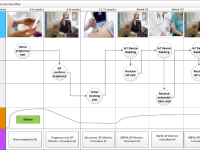Recognising the need for a high level of Cyber Security across the public sector, the National Cyber Security Strategy (NCSS) called for the creation of a Common Cyber Security Baseline Standard across all Public Sector Bodies and for the establishment of the “CORE Network” to share best practice for cyber security across Government. This project embodies the Irish Civil Service Renewal 2030 Strategy by delivering evidence-informed policy and services, harnessing digital technology and…
Case Study Library
Where innovations are collected and shared to disseminate and replicate good ideas

Innovations:
0
This website, as well as any data and map included herein, are without prejudice to the status of or sovereignty over any territory, to the delimitation of international frontiers and boundaries and to the name of any territory, city or area.
The move to introduce a Blended Working Policy across the Irish Civil Service represents the most significant change to working arrangements in decades. Building on the proven success of remote working in response to the pandemic, this shift in traditional working arrangements represents a major change. And it enhances the Irish Civil Service's positioning as an Employer of Choice to attract and retain a new generation of workers who prioritise flexibility, self-development, mobility, and…
Louth County Council has piloted a new training resource, the Healthy Ireland Design Innovation (HIDI), which assists cross-departmental staff to apply the principles and goals of ‘universal design’ to their local economic and community planning activities. Taking a ‘universal design’ approach provides an ‘awareness framework’ to align innovation across the varying strands of local service and activity planning. As a result, staff can better plan for the integrated health, wellbeing,…
The Future Tech Challenge (FTC) is a pilot initiative led by DPER to connect and collaborate across the wider ecosystem, and engage in transformative innovation by experimenting with, and applying new technology to address pressing public sector problems and opportunities that deliver improved services to the public. Drive innovation using emerging technology, enhance collaboration, meet National strategic priorities, generate knowledge & learnings and develop prototyped solutions.
Case Study
Driving Artificial Intelligence in Public Services through accredited upskilling and project…
The Foundation Certificate in AI project seeks to make Ireland a world-leader in the ethical application of Artificial Intelligence across the Irish civil and public services by 2030 and is in line with the digital ambition, which the government of Ireland set itself. The project aims to upskill/reskill Irish Civil & Public Servants, identify a pipeline of potential AI projects that can improve service delivery, deliver value for money and is aligned National Strategy in AI & Innovation.
Case Study
The ‘Integrated Patient Journey Map’: A Design Tool for Embedding the Pillars of Quality in…

IPJM offers a constructive tool for multi-disciplinary teams to work together in designing healthcare solutions, through mapping the physical and emotional journey of patients for both the current service and the proposed service reform. It supports groups in understanding and negotiating the conflicting requirements that can arise during transformational projects. This is achieved using journey mapping and user personas for graphically externalising key domain knowledge.
The first public service-wide Innovation Week in Ireland was held in December 2019 where public service bodies collectively developed over 200 events and activities across the country to spotlight innovation. Teams had an opportunity to explore the meaning of innovation in order to create a common language, participate in engaging and creative sessions and collaborate with colleagues from across other areas of the public service and beyond.
The Public Service Innovation Fund provides public service bodies in Ireland with a means to fund innovative projects that may not otherwise get financed by their organisations. It was developed to help promote a greater culture of innovation and experimentation in the Irish Public Service, and to showcase the benefits of innovation to other public servants considering embarking on their own innovative project. This is Ireland's first public service-only innovation funding mechanism.
Case Study
Using behavioural insights to increase patient engagement with validation of hospital waiting lists
Administrative validation of waiting list is where patients are contacted by hospitals in writing to confirm if they still require hospital care or wish to be removed from a waiting list. Many patients do not reply to validation letters. This innovation involved a collaborative redesign of the validation letter, the application of a range of behavioural insights to letter design and testing through a randomised control trial.
Originally conceived as a planning tool, HeritageMaps.ie is a user-driven, web-based mapviewer focusing on the built, cultural and natural heritage around Ireland and offshore. Its potential for use by the general public was quickly realised and users can now access 700+ up-to-date heritage datasets in map-form, originally provided across many Govt. platforms. HeritageMaps.ie a free ‘one-stop-shop’ for heritage data and acts as a discovery portal, providing direct links to promote research.

